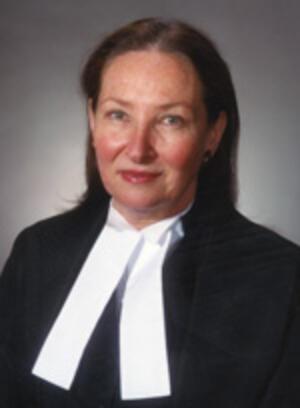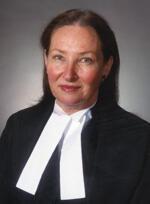Rosalie Silberman Abella
Rosalie Silberman Abella became Canada’s first Jewish woman judge and Canada’s youngest ever judge when she was appointed to the Ontario Family Court in 1975 at the age of 29. Abella’s remarkable accomplishments include her appointment to the Human Rights Commission of Ontario and the ground-breaking study she authored on accessibility. She was the author of the 1984 federal Royal Commission on Equality in Empowerment, in which she pioneered the theories of equality and discrimination—which were then adopted by the Supreme Court of Canada as well as governments in New Zealand, Northern Ireland, and South Africa. In 1992 Abella was elevated to the Ontario Court of Appeal and in 2004 she became the first Jewish woman to sit on the Supreme Court of Canada. She retired from her Supreme Court position in 2021.
Family Background & Education
Born in a displaced persons camp in Stuttgart, Germany, on July 1, 1946, Rosie Silberman was the daughter of Jacob and Fanny Silberman. Jacob, the son of a bookstore owner, was born in Sienno, Poland (82 km WSW of Lublin), in 1910, while Fanny Krongold, the daughter of a wealthy roofing supply manufacturer, was born in Ostrowiec in 1917. They were married on September 3, 1939, just as the Germans began marching through Poland. Though the Germans murdered their two-year-old child, both survived the Holocaust. Rosalie’s father was liberated from Theresienstadt, while Fanny survived various camps before being liberated from Buchenwald. After being reunited—Fanny actually travelled by train to Theresienstadt when she learned her husband was alive and was detained there because of a typhoid epidemic—they made their way to Stuttgart. Jacob, who had a law degree from the famous Jagiellonian University in Cracow, was appointed by the Americans as head of legal services for residents of the displaced persons camp.
In 1950 the family was admitted into Canada, though Jacob was not allowed to practice law because he was not a citizen. He was allowed into Canada as a shepherd and underwear cutter. It was then that young Rosie decided to become a lawyer.
The family did well in Canada. Jacob was a successful insurance agent until his death in 1970, while Fanny became involved in real estate after he died. By the age of ten, Rosie became well known as a piano prodigy, winning many medals and awards and appearing regularly on television. She was one of the youngest graduates of the Royal Conservatory of Music, with a diploma in classical piano. At the same time she graduated from high school with one of the highest grade averages in the Province of Ontario.
She entered the University of Toronto and graduated from its law school in 1970. Six years later, after opening a practice in civil and criminal litigation, at the age of 29, she was appointed to the Ontario Family Court, thus becoming Canada’s first Jewish woman judge and the country’s youngest ever. She was also Canada’s first pregnant judge.
In 1968 Rosalie married Irving Abella (1940-2022), the J. Richard Shiff Professor of Canadian Jewish Studies at York University in Toronto. They had two sons, Jacob, born in 1973, and Zachary, born in 1976. Not surprisingly, both are lawyers.
Judicial Career
Abella’s accomplishments have been remarkable and have made her one of the most admired and honored women in the country. While still in her twenties she was appointed a member of the Human Rights Commission of Ontario, of the Premier’s Advisory Committee on Confederation, of the Ontario Public Service Labour Relations Tribunal, and of the University of Toronto Academic Discipline Tribunal. She also wrote a ground-breaking study on Access to Legal Services by the Disabled. In 1984 she was the first woman chair of the Ontario Labour Relations Board and in 1988 she became the first woman in the British Commonwealth to become the head of a Law Reform Commission.
Abella was the sole Commissioner and author of the 1984 federal Royal Commission on Equality in Employment, in which she created the term and concept of “employment equity,” a new and unique strategy for reducing barriers in employment faced by women, aboriginal people, non-whites, and persons with disabilities. The theories of “equality” and “discrimination” she developed in her Report were adopted by the Supreme Court of Canada in its first decision dealing with equality rights under the Charter of Rights and Freedoms added to the Canadian Constitution in 1982. Her report has been implemented by the governments of Canada, New Zealand, Northern Ireland, and South Africa.
In 1988 Abella moderated the nationally televised leaders’ debate culminating that year’s federal election campaign. She also became the Boulton Visiting Professor of Law at McGill University for four years and a Distinguished Visiting Professor at the University of Toronto Law School for three years. In addition, she was asked by the federal government in 1992 to chair the Constitutional Conferences, set up to deal with the crisis over the role of Quebec within Canada. In March 1992 she was elevated to the Ontario Court of Appeal. In August 2004 she was appointed to the Supreme Court of Canada, becoming the first Jewish woman to sit on the Canadian Supreme Court bench. Abella retired from her Supreme Court Position on her 75th birthday, July 1, 2021.
Rosalie Abella is author or co-author of four books and over 90 articles. She has delivered hundreds of lectures all over Canada as well as in Israel, the United States, Great Britain, Hungary, Slovakia, the Czech Republic, New Zealand, Australia, and Northern Ireland. She is on the International Board of the Hebrew University, a member of the United States Holocaust Museum’s Committee on Conscience, and a former trustee of the McGill Institute for the Study of Canada.
Abella began her role as a Visiting Professor at Harvard Law School on the day she retired from the Supreme Court. She also served as a Visiting Professor at Fordham University School of Law during the Spring 2022 semester.
Awards & Legacy
Justice Abella has approximately 38 honorary degrees and was the first sitting judge elected a fellow of the Royal Society of Canada, an organization consisting of Canada’s leading scholars. She was also the first incumbent of the James R. Bullock Visiting Chair in Canadian Studies at the Hebrew University in 1999 and the first woman to receive the Distinguished Alumnus Award from the University of Toronto Faculty of Law. She was a judge of the 2003 Giller Awards, Canada’s most prestigious literary prize. Justice Abella was awarded the 2003 International Justice Prize of the Peter Gruber Foundation and the 2004 Walter S. Tarnopolsky Award for Human Rights by the Canadian Bar Association and the International Commission of Jurists, whose president (Canadian Section) cited her as one whose “entire life has revolved around the cause of human rights… She has shaped Canadian policy in equality rights, and…has also had a profound impact on human rights law and policy outside Canada. Her contributions to society as a lawyer, teacher, commissioner, and judge have always been shaped by her profound humanity.”
Extensively involved in judicial education, Abella organized the first judges’ conference in which all levels of the judiciary participated, the first national educational program for administrative tribunals, and the first national conference for Canada’s female judges.
In 2007 Abella was elected to the American Academy of Arts and Sciences. In 2012 she was awarded the Queen Elizabeth II Diamond Jubilee Medal, issued to her by Canada for her exemplary accomplishments in public service. Abella was the first Canadian woman awarded an honorary degree from Yale University when she was awarded a Doctor of Laws degree in 2016. Her citation from Yale University states: “As one of the world’s finest living judges, you approach your work with zest, empathy, and superb intelligence.” Abella was the fourth winner of the Global Jurist of the Year award for 2016. The title was awarded to her by Northwestern Pritzker School of Law. In 2018 Abella was elected to the American Philosophical Society and is one of about 1,000 members.
Selected Works
Equality in Employment: A Royal Commission Report. Government of Canada. Ottawa: 1984
Justice Beyond Orwell. Canadian Institute for the Administration of Justice. Montreal: 1985
“Law, Literature and Identity: Seeking Equality.” Saskatchewan Law Review (2000): 1–2.
“The Judicial Role in a Democratic State.” Queen’s Law Journal (2001): 573–593.
DeGregorio, Erin. “Justice Rosalie Silberman Abella of Canada's Supreme Court Named Mulligan Distinguished Visiting Professor at Fordham Law.” Fordham Law, May 25, 2022; https://news.law.fordham.edu/blog/2021/12/22/justice-rosalie-silberman-abella-named-mulligan-distinguished-visiting-professor/.
Fine, Sean. “Canadian Judge Rosalie Abella Named Global Jurist of the Year.” The Globe and Mail, January 13, 2017; https://www.theglobeandmail.com/news/national/canadian-judge-rosalie-abella-named-global-jurist-of-the-year/article33610039/.
“Honorary Degrees Awarded to Nine Outstanding Individuals.” YaleNews, November 18, 2021; https://news.yale.edu/2016/05/22/honorary-degrees-awarded-nine-outstanding-individuals.
MacDonald, |By L. Ian. “Harvard Bound: Justice Abella's Well-Earned Non-Retirement.” Policy Magazine, April 9, 2021; https://www.policymagazine.ca/harvard-bound-justice-abellas-well-earned-non-retirement/




